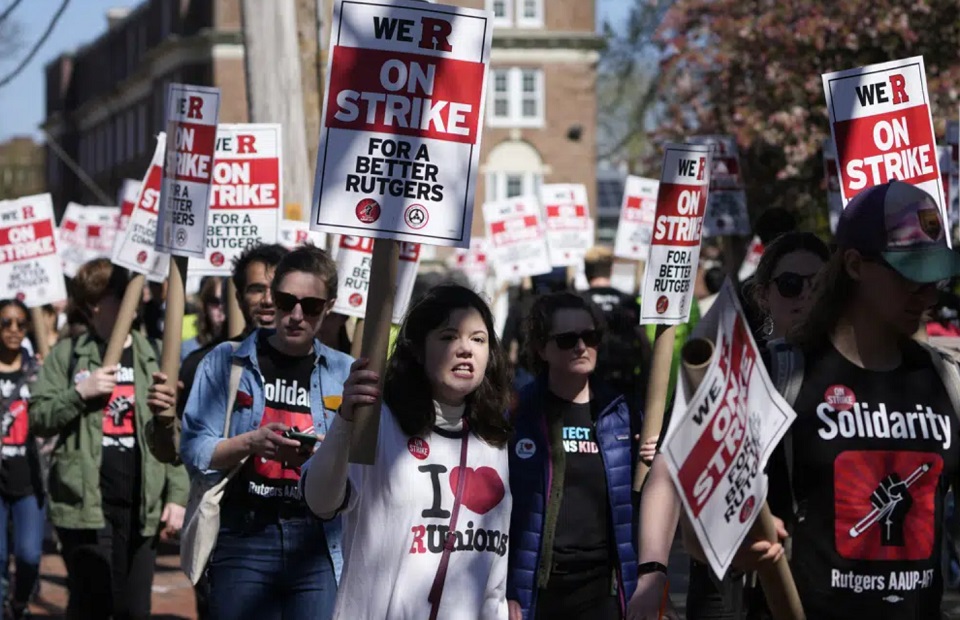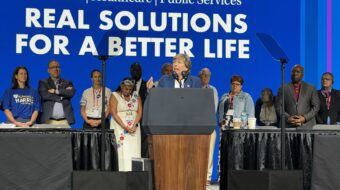
NEW BRUNSWICK, N.J. —An incomplete tentative four-year agreement gives 9,000 Rutgers University workers nice raises. In turn, they suspended—but didn’t end—their forced strike.
But in an indication that not all was fine and dandy, the workers, members of two AFT-AAUP locals and an independent union for the adjunct professors, held informational picketing during the university’s April 20 board meeting.
And while the Biomedical and Health Sciences Center hospital complex in New Brunswick, N.J., (BHSNJ) stayed open for emergency procedures—as the local for its workers promised—conflicts there are prominent on the list of unsolved contract provisions.
So hospital workers picketed on April 18. “The administration needs to hear from us that we are joining together as three unions, and we are out of patience,” they said. Conflicts remain elsewhere, too. The bottom line result is the three unions said if Rutgers management didn’t come to a satisfactory agreement on everything, they’d be forced to walk again.
The forced strike, the first-ever in Rutgers’s 257-year history, revolved around low pay, lack of respect, and little job security for the university’s medical complex workers, its adjunct faculty, and graduate student workers, including teaching assistants and research assistants.
When the workers had to walk in early April, all three campuses, in New Brunswick, Camden, and Newark, were forced to shut. That affected the university’s 67,000 students and the three union locals went to bat for them, too, demanding a rent freeze for campus housing in high-cost New Jersey. In past years, the rents rose, but pay for workers, student workers, and residents didn’t.
The raises for faculty—many of them at the hospital—TAs, RAs, and graduate student workers convinced the bargaining committee to tell the unionized workers to return, starting April 17. But in an unusual move, the bargaining committee posted online not just the provisions the two sides agreed on, such as the raises, but the ones that are still open.
“Our strike last week was an amazing demonstration of our power as a union,” the locals posted that day. “While the strike is suspended, bargaining is still going on. We still have core issues on the table and we need to make sure we win the contract we all deserve. That’s why we’re organizing pickets and actions throughout this week on all three campuses.
“If we do not secure the gains we need on the open issues through bargaining in the coming days, we can and will resume our work stoppage,” the committee warned. “In addition, biomedical faculty in AAUP-BHSNJ have a lot of open items specific to them within our new unified contract, and graduate workers do as well. We need to focus pressure on the administration during bargaining.”
The teaching assistants and graduate assistants, who now earn around $30,000 yearly, would get a retroactive 2022 raise to $34,678, including a $1,500 lump sum bonus. Their 2023 pay would be $35,335, followed by $36,395 in 2024 and $40,000 in 2025.
Full-time professors would get a flat $5,000 raise each retroactive to 2022, then 10.25% over the following three years. Post-doctoral workers, who shoulder much of the university’s teaching and research load, would get 25.5% over four years. The tentative deal also mandates five-year individual contracts for many, but the workers and the bosses still differ on some details. One omission: No mention of the rent freeze.
And while there will be a new Rutgers-wide “Caste Task Force” to handle “discrimination claims alleging caste discrimination based on ancestry, nationality, gender, and religion,” issues of diversity, pay equity and academic freedom are still unsolved.
Academic freedom has long been a key emphasis of the American Association of University Professors (AAUP), which after 100 years as an independent association, merged into the Teachers (AFT) but kept its own structure.
We hope you appreciated this article. Before you go, please support great working-class and pro-people journalism by donating to People’s World.
We are not neutral. Our mission is to be a voice for truth, democracy, the environment, and socialism. We believe in people before profits. So, we take sides. Yours!
We are part of the pro-democracy media contesting the vast right-wing media propaganda ecosystem brainwashing tens of millions and putting democracy at risk.
Our journalism is free of corporate influence and paywalls because we are totally reader supported. At People’s World, we believe news and information should be free and accessible to all.
But we need your help. It takes money—a lot of it—to produce and cover unique stories you see in our pages. Only you, our readers and supporters, make this possible. If you enjoy reading People’s World and the stories we bring you, support our work by donating or becoming a monthly sustainer today.












Comments